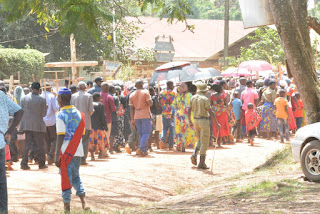As well as treating the sick, Kisiizi Hospital also has a
tourist attraction. One of the reasons the hospital was built here was the
availability of water, and in particular for the hydro-electric system serviced
by the local river and waterfall.
However, in Uganda if a daughter became pregnant before
marriage and before a bride-price had been agreed then this not only brought
great shame on the family, but meant that her value as a potential bride was
shattered.
Different family groups had different practices. In the
neighbouring town of Kabale the practice was to abandon a pregnant daughter on
a small island at the centre of a lake to either die, or be claimed by any man
who wanted her, who might not normally be able to afford a bride price.
In Kisiizi the custom was that the family would take the
daughter to the top of the waterfall, and push her over to her death.
The task of execution was given to the eldest brother, because he would have expected the bride-price received for his sister to be used to pay for his own bride, and her pregnancy had denied him of that money / herd of cows.
Fortunately the custom of executing pregnant daughters no
longer happens, in part due to the teaching of missionaries who first came to the region
about 100 years ago, though the custom of bride-price continues.
A few years ago a sculpture was erected showing the change
to Kisiizi.
Once this was a place of death and grief for unmarried pregnant women and their families;
now it's a hospital sharing the good news of Easter, and a place of joy and new life.
To celebrate Christian new spiritual life, on Good Friday services are held to remember Jesus’s
sacrifice so that we might live. One of the local catholic churches held a walk
of witness which passed the hospital, which was one of the places where they stopped
and prayed for the area.
Footnote:
If you are shocked by Bakiga culture,the local young women here are shocked by how little value Britsh culture places on our daughters. Our custom was that the bride's family had to pay a dowry to the groom's family before the marriage. It is still common for the bride's family to pay for the wedding.














































